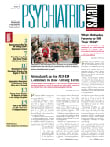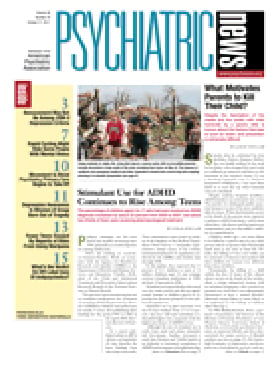A man or woman loses a spouse, partner, or child to disease or accident.
Is the resulting grief and sadness distinguishable from clinical depression? Can any episode of depression, no matter how evidently "biological" in nature, be divorced from the life circumstances that precede or precipitate or surround the depression?
Those are questions that members of the DSM-5 Work Group on Depressive Disorder have confronted in coming to one of the more controversial proposals for the new diagnostic manual due to be published in 2013—to eliminate the "grief exclusion" in criteria for a diagnosis of major depression. The grief exclusion criterion, included in DSM-III and DSM-IV, states that someone who has experienced a recent bereavement is not eligible for a diagnosis of major depression.
But the work group for the new manual is proposing that the exclusion be eliminated, citing a body of research showing no distinguishable difference in response to treatment between those with grief-related depression and those with major depression unrelated to grief.
This is one of several major proposals for the chapter on depressive disorders. Others include the addition of premenstrual dysphoria as a diagnostic category, the elimination of "mixed states" as a separate category within the section on bipolar disorder, and the inclusion of ratings for anxiety and for suicide risk in the diagnosis of depression (see
Other Proposed Changes to Criteria for Depression).
All of the work group proposals are now being field tested and will undergo review by the DSM-5 Scientific Review Committee.
The elimination of the grief exclusion has attracted public attention and some controversy. Allen Frances, M.D., chair of the Task Force for DSM-IV, lamented the proposed elimination (in a New York Times editorial on August 14) as the "medicalization of normal emotion," saying "grieving is an unavoidable part of life—the necessary price we all pay for having the ability to love other people."
But Jan Fawcett, M.D., chair of the DSM-5 depression work group, told Psychiatric News that a broad range of evidence shows that there are few or no systematic differences between individuals who develop a major depression in response to bereavement and in response to other severe stressors, and no difference in response to treatment.
"The question is, Should not people who develop the symptoms and the level of impairment associated with major depression receive a diagnosis and become eligible for treatment?" he said in an interview. "We think the arguments are strong that people should have access to treatment."
Fawcett wondered: Is there any difference between depression that occurs in response to grief and that which occurs in response to any other life stress? "Where do you draw the line?" he asked.
In a statement released last year and published on the DSM-5 Web site, former work group member Ken Kendler, M.D., who is now a member of the DSM-5 Scientific Review Committee, put forward a similar argument. "The DSM-IV position [on the grief exclusion] is not logically defensible," Kendler said. "Either the grief exclusion criterion needs to be eliminated, or [it should be] extended so that no depression that arises in the setting of adversity would be diagnosable. This latter approach would represent a major shift, unsupported by a range of scientific evidence, in the nature of our concept of depression, as epidemiologic studies show that the majority of individuals develop major depression in the setting of psychosocial adversity."
Fawcett and Kendler both also stressed that a diagnosis of depression does not necessarily dictate any particular kind of treatment—or, indeed, any treatment at all.
"Diagnosis in psychiatry, as in the rest of medicine, provides the possibility but by no means the requirement that treatment be initiated," Kendler wrote in his statement. "Watchful waiting is an important tool for all skilled clinicians. As a good internist might adopt a watch-and-wait attitude toward a diagnosable upper respiratory infection assuming that it is unlikely to progress to a pneumonia, so a good psychiatrist, on seeing an individual with major depression after bereavement, would start with a diagnostic evaluation.
"If the criteria for major depression are met, then he or she would then have the opportunity to assess whether a conservative watch-and-wait approach is indicated or whether, because of suicidal ideation, major role impairment, or a substantial clinical worsening, the benefits of treatment outweigh the limitations."

